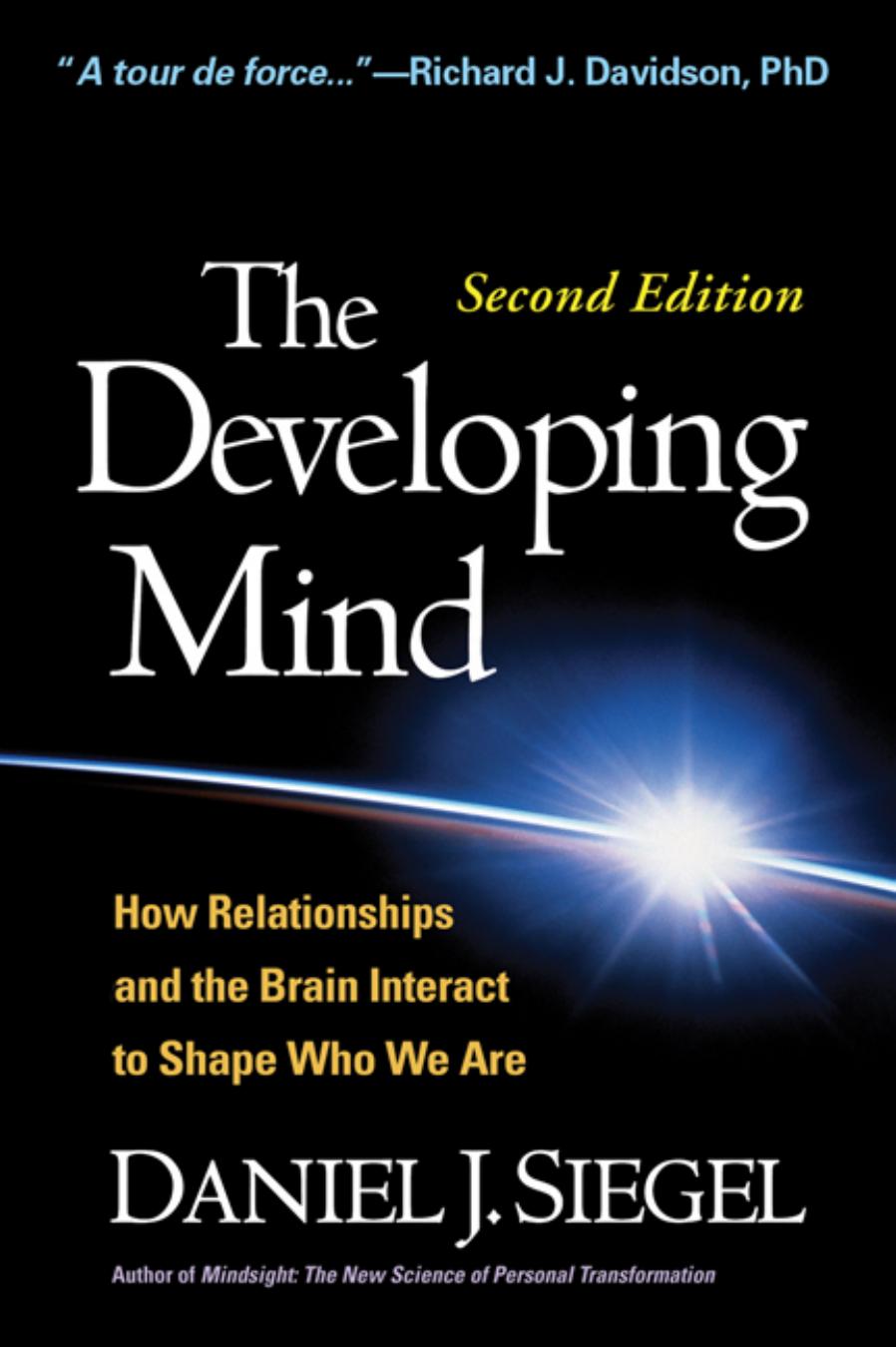The Developing Mind, Second Edition: How Relationships and the Brain Interact to Shape Who We Are by Daniel J. Siegel

Author:Daniel J. Siegel [Siegel, Daniel J.]
Language: eng
Format: azw3, pdf
ISBN: 9781462503926
Publisher: Guilford Publications
Published: 2012-04-25T16:00:00+00:00
HOW DOES EXPERIENCE INFLUENCE
HEMISPHERIC SPECIALIZATION?
There are developmental phases in which primarily one, then the other, hemisphere grows and expands.91 In the first few years of life, as described earlier, the right hemisphere is both more active and growing more rapidly. After these first years, the left hemisphere becomes more dominant in activity and development. By the end of the third year of life, the corpus callosum allows for the transfer of information between the two hemispheres. The mind is created, in part, from the whole brain within the activity of its disparate circuits, their interactions with each other, and their interactions with the body as a whole. As we’ve seen, the intrinsic motive formation system may exist before the neocortical capacity to construct representations even begins. The developing mind of the child reflects the manner in which it is anatomically predisposed to processing information. After four years of age, children usually become much more facile at using words to describe their inner states and impulses. Preschools take advantage of this developmental capacity in helping children learn to socialize with their peers by utilizing language to express what they feel and want. Such accomplishments require the joint cooperation of both hemispheres and may not be possible at an earlier age in most children.
We know from studies of children and adults with neurological lesions that the brain can adapt to experiential pressures.92 For example, in young children with severe forms of epilepsy who have had to undergo treatment involving removal of an entire hemisphere, the remaining half of the brain appears to be able to take on the functions (such as language) of the now missing hemisphere. In adults suffering from strokes, however, the brain may not be so “plastic” or able to adapt to loss of specialized functions.93 Through lengthy rehabilitation efforts, however, experience can result in the emergence of needed old functions within new circuits. The same appears to be true in cases of congenital impairment of certain sensory modalities, such as sight, in which other modalities (such as touch) utilize the anatomic zones usually specializing in the impaired mode.94
In professional musicians, the study of music appears to involve the growth and development of parts of the brain in a different manner from their development in the casual music listener. Specifically, some studies suggest that the left brain’s language-based, analytic mode becomes a more dominant part of the music experience with education and formal training. This appears to involve judgments about duration, sequence, and rhythm. In contrast, the right side’s ability appears to be stronger in the areas of tonal memory, melody recognition, and intensity. The complexity of how various forms of musical training affect brain organization, however, makes it difficult to make global lateralized conclusions, especially when developmental age is taken into account.95 One view of music and the brain suggests that rhythm links the body proper with the functioning of the higher neural regions of the cortex; melody builds on the anticipatory functions of the neocortex in integrating the familiar with the novel in the capturing of the musical imagination.
Download
The Developing Mind, Second Edition: How Relationships and the Brain Interact to Shape Who We Are by Daniel J. Siegel.pdf
This site does not store any files on its server. We only index and link to content provided by other sites. Please contact the content providers to delete copyright contents if any and email us, we'll remove relevant links or contents immediately.
Cecilia; Or, Memoirs of an Heiress — Volume 1 by Fanny Burney(32538)
Cecilia; Or, Memoirs of an Heiress — Volume 2 by Fanny Burney(31934)
Cecilia; Or, Memoirs of an Heiress — Volume 3 by Fanny Burney(31925)
The Great Music City by Andrea Baker(31911)
We're Going to Need More Wine by Gabrielle Union(19031)
All the Missing Girls by Megan Miranda(15925)
Pimp by Iceberg Slim(14476)
Bombshells: Glamour Girls of a Lifetime by Sullivan Steve(14046)
For the Love of Europe by Rick Steves(13862)
Talking to Strangers by Malcolm Gladwell(13340)
Norse Mythology by Gaiman Neil(13332)
Fifty Shades Freed by E L James(13228)
Mindhunter: Inside the FBI's Elite Serial Crime Unit by John E. Douglas & Mark Olshaker(9312)
Crazy Rich Asians by Kevin Kwan(9271)
The Lost Art of Listening by Michael P. Nichols(7486)
Enlightenment Now: The Case for Reason, Science, Humanism, and Progress by Steven Pinker(7303)
The Four Agreements by Don Miguel Ruiz(6739)
Bad Blood by John Carreyrou(6608)
Weapons of Math Destruction by Cathy O'Neil(6260)
